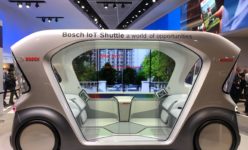In the past few days, those responsible for public transport in various European cities have documented their rethinking. Hamburger Hochbahn AG has placed a major order for 20 Mercedes-Benz eCitaro electric buses. This is the largest single order to date from a German transport company for fully electrically powered buses.
At almost the same time a second order came for the Stuttgart based company, this time from Berlin: the Berlin public transport company BVG ordered a further 15 units of the all-electric eCitaro. They will be delivered from the first quarter of 2019. The EMT transport company in the Spanish capital of Madrid chooses gas. Over the next two years, a total of 276 Mercedes-Benz Citaro NGT city buses with gas engines will be delivered there.
Clean public transport is the basis for cleaner air in our cities.
The simple calculation shows how important these changes are in public transport. A bus can accommodate between 80 and 150 people. On average, only 1.2 people sit in a car when driving to the office in the morning. On the evening return journey, exactly the same thing happens. It is not difficult to understand why clean public transport is the basis for better air in our cities. These figures can be extrapolated further in an S-Bahn or U-Bahn.
And this is precisely why, with all the current hype about e-scooters and e-bikes, it is important to consistently invest in cleaner technologies, especially among public transport providers. Three major European cities are showing the way these days.
The Hanseatic City of Hamburg places largest order for electric buses
The first production-ready electric bus rolls through the Hanseatic City of Hamburg. This marks the beginning of the consistent conversion of the entire fleet of around 1,000 buses operated by Hamburger Hochbahn AG. Last year, the Hamburg-based company invited tenders for the supply of 60 production-ready electric buses for the years 2019 and 2020 throughout Europe. The first 30 buses (20 eCitaro from Mercedes-Benz and 10 Urbino nE12 from Solaris) were ordered at the beginning of May. It was the largest single order for electric buses ever placed by a German public transport company. The next 30 vehicles will be delivered in 2020.
By the year 2030, the entire fleet of Hochbahn vehicles is to be converted to emission-free drives. Till Oberwörder, Head of Daimler Buses, explained: “Hamburger Hochbahn AG is one of the recognized pioneers for alternative drives in public transport. With the new eCitaro, we have developed a well thought-out and mature city bus concept that decisively promotes electric mobility in cities.
The modular battery packs have a total capacity of up to 243 kWh. In the eCitaro, they are cooled to the ideal temperature, which means maximum charging, maximum usable capacity and a long service life. The batteries are charged via a plug in the depot. They drive two electric motors close to the wheel hub.
Berlin builds on a framework agreement
The procedure in Berlin is interesting. There, the BVG Supervisory Board had already approved the award to Mercedes-Benz in April. On the basis of framework agreements, BVG can procure up to 600 articulated buses and up to 350 single-deckers, but without a purchase obligation. And this is the background: the procurement structure is dependent on the market development for electric buses. The faster they are ramped up, the less conventionally operated vehicles the BVG will call for. The first 15 eCitaro city buses are therefore just the beginning and will then be successively extended with further increasing ranges.
“With these modern and comfortable buses, our fleet will stay up to date,” said Dr. Sigrid Nikutta, Chairman of the Board of Management and Chief Operations Officer of BVG. And so, “thanks to flexible framework agreements, the Berliners can consistently pursue our strategy of converting our bus fleet to electric drive”.
Madrid focuses on gas
The fourth major order from Madrid for the bus manufacturer from Stuttgart has already been received in quick succession. Two years ago EMT had already ordered the first 82 city buses of the then newly introduced Citaro NGT. In the following year, the company ordered a further 314 buses.
Together with the current order, a total of 672 environmentally friendly Citaro NGTs will be in service in Madrid from 2020. If bio natural gas is used, a natural gas bus will even run almost CO2-neutral. In addition, its noise emissions are up to 4 dB(A) lower. This corresponds to roughly halving the subjectively perceived noise level. Therefore, the Citaro NGT is ideally suited for use in highly frequented cities and metropolitan regions.
Three different approaches in Hamburg, Berlin and Madrid show how quickly this conversion of bus fleets in large cities can be tackled. The time for excuses such as too low ranges of electric buses is over. Public transport plays a very important role in the future cleanliness of cities, as the three cities mentioned above demonstrate.
More posts from the category “News”:
Post a Comment
You must be logged in to post a comment.























